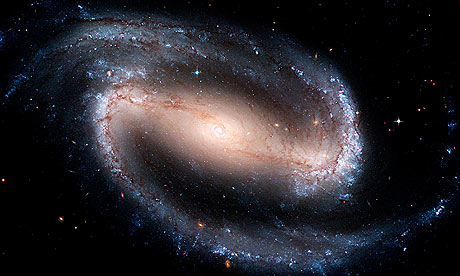The future to be found in good fiction is stranger, larger and grander than anything you can find in three dimensions, argues the acclaimed German novelist

Farther than fact can see ... the barred spiral galaxy NGC 1300, 69m light years from Earth. Photograph: Nasa/AFP/Getty Images
I want to begin by making a confession: I like it when novelists are dead. I find it pleasant to hold a novel in my hand and to know that its author is no longer among us. The spontaneous sympathy I then feel for both text and writer is even a little bit more heartfelt if the book is out of print; if I had to get hold of it secondhand from one of those dubious online dealers who offer as-new copies so cheaply that the cost of delivery exceeds the now no more than symbolic cost of the book itself.
I always read a novel which has become that cheap to the end. I feel an almost personal obligation to do so. I keep going to the very last page, even if it can't really grip me and push against my limits; even if I begin to fear that it was never, even when it was written, a good book. Then I put it in the wastepaper sack along with the newspapers of the last few days. It's a little like laying to rest a mummy that was displayed, undignifiedly and for far too long, in a museum. The memory of this good deed is the last future which, for a little while at least, we will share.
I know that this feeling has something to do with the way I imagine the past of the novel. If I don't shy away from a megalomaniac sense of vertigo, I am briefly able to imagine the totality of all the novels ever written: thousands upon thousands of manuscripts, of which many – presumably only a minority, but still a mighty host – have become books, lingering for a time in libraries or other memories until they too disappear into nowhere.
Full essay at The Guardian
I always read a novel which has become that cheap to the end. I feel an almost personal obligation to do so. I keep going to the very last page, even if it can't really grip me and push against my limits; even if I begin to fear that it was never, even when it was written, a good book. Then I put it in the wastepaper sack along with the newspapers of the last few days. It's a little like laying to rest a mummy that was displayed, undignifiedly and for far too long, in a museum. The memory of this good deed is the last future which, for a little while at least, we will share.
I know that this feeling has something to do with the way I imagine the past of the novel. If I don't shy away from a megalomaniac sense of vertigo, I am briefly able to imagine the totality of all the novels ever written: thousands upon thousands of manuscripts, of which many – presumably only a minority, but still a mighty host – have become books, lingering for a time in libraries or other memories until they too disappear into nowhere.
Full essay at The Guardian

No comments:
Post a Comment